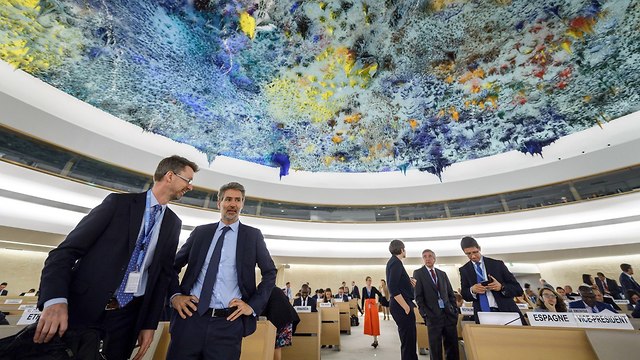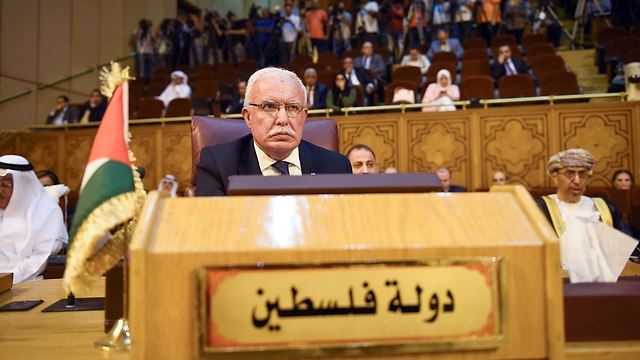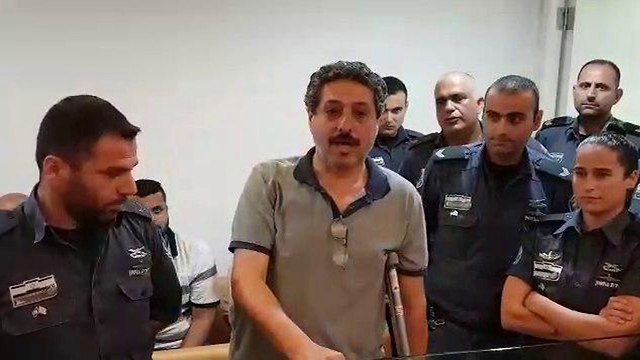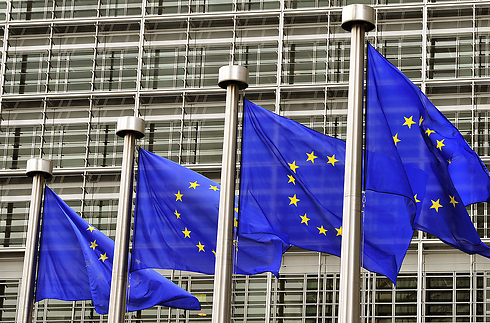Op-ed: As part of their strategy to internationalize the conflict, the Palestinians are trying to replace the language too: To stop ‘talking diplomatically’ and start ‘talking legally.’ The Israeli challenge, therefore, isn’t to win in Gaza, but to win in the international arena.
Three events from the recent days should ring serious alarm bells among Israel’s decision makers.
The first event, which received widespread media coverage, was the United Nations Human Rights Council (UNHRC) meeting last week. Unsurprisingly, the UNHRC voted to set up a commission of inquiry into last week’s events on the Gaza Strip border.

Following the decision, UN High Commissioner for Human Rights Dr. Zeid Ra’ad Al-Hussein is expected to appoint an international committee to investigate the “violations of human rights and international law in the occupies Palestinian territories.”
We should pay attention to the wide definition of the mandate that will be given to the committee, which is expected to be a rerun of the notorious Goldstone Commission. We’ll discuss this broad definition later on.
A second event took place on Tuesday in The Hague, where Palestinian Foreign Minister Riyad al-Maliki met with the International Criminal Court (ICC)’s chief prosecutor and asked her to open an investigation against Israel. The immediate context of the request was recent events on the border between Israel and the Gaza Strip, but this time the appeal included a request for a much broader investigation.

Al-Maliki demanded that the ICC, which already launched an investigation against Israel in 2015, investigate Israel’s “crimes” concerning the expansion of the settlement enterprise and what the Palestinians refer to as “land theft.”
The Palestinians are demanding that, as part of the investigation, the ICC take action against senior Israeli officials who they say are personally responsible for the activity in each of these fields.
A third event, allegedly unrelated but actually very related, was Tuesday’s European Union (EU) statement urging Israel to launch an immediate investigation into the circumstances surrounding the wounding of Jafar Farah, director of Mossawa Center—the Advocacy Center for Palestinian Arab citizens in Israel—who was arrested over the weekend during a protest in Haifa against Israel’s handling of the Gaza border riots.

The Israel Police doesn’t have a great track record, to say the least, when it comes to police violence, and the issue should be thoroughly investigated. But all this has nothing to do with the EU’s appeal.
After all, the EU didn’t urge Israel to investigate the wounding of Meni Naftali during a protest in Petah Tikva or the wounding of Aryeh Eldad and Moti Yogev during the evacuation of Amona. This appeal has to do with the specific context of the protest in which Farah was arrested.
These three events are related not because of their specific content, and not because of the people behind them. The UNHRC is not the ICC, and the ICC is not the EU. Most EU countries didn’t even support the UNHRC’s decision on an investigation against Israel; unfortunately, they didn’t oppose it either.
These events are related because they reflect a trend the Palestinians have been putting a lot of effort into for years, but now, in light of the Gaza events, it is being reinforced. I’m talking about the Palestinian attempt to internationalize the conflict, and largely to “legalize” it as well.
The goal is to move the conflict management arena from the southern border and Judea and Samaria to the UN building in New York, to Geneva, to The Hague and to Brussels.

The Palestinian hope, which isn’t irrational, is that moving the conflict to the international stage will change the balance of power: While on the Gaza border Israel enjoys a numerical, technological and qualitative advantage, in the international arena the equation changes.
As part of this strategy, the Palestinians are trying to replace the conflict management language as well: To stop “talking diplomatically” and start “talking legally.” Their assumption—which isn’t groundless, unfortunately—is that the international language of law, which is highly affected by the hostile legal-academic language against Israel around the world, will cause damage to Israel.
This is the arena in which Israel must invest a considerable and decisive part of its efforts. Winning on the Gaza border is very important, but also relatively easy.
Winning in The Hague and in Geneva is much harder. Efforts must be put into time and resources too, but they must focus decision makers’ attention.
As reported by Ynetnews
